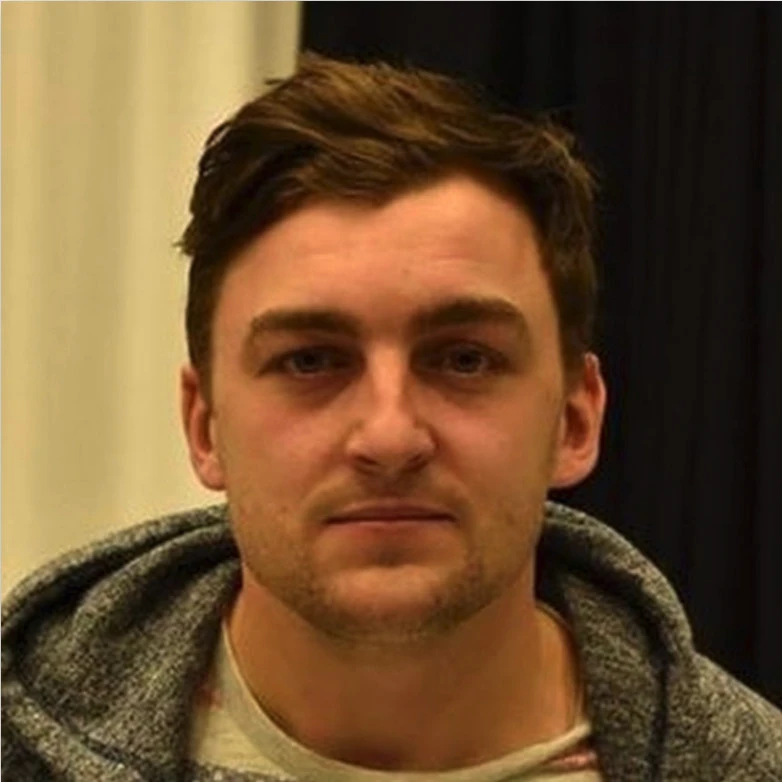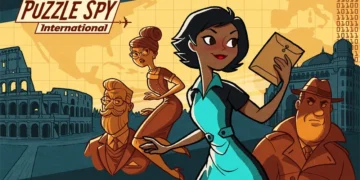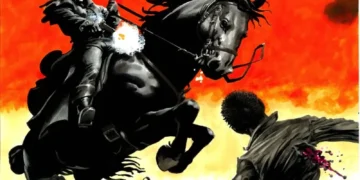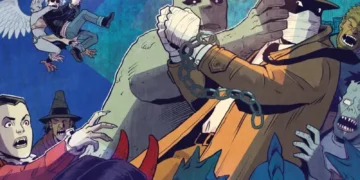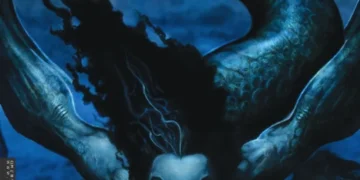Cast: Jude Law, Nicholas Hoult, Tye Sheridan, Jurnee Smollett, Alison Oliver, Marc Maron
Genre: Crime, Drama, Thriller
Director: Justin Kurzel
In Irish Cinemas: 27th December 2024
Justin Kurzel’s filmmaking is steeped in a dark, menacing intensity, characterised by his unflinching exploration of themes like fractured masculinity and wounded national identity. His films often probe how these forces intersect to justify or perpetuate violence, creating a body of work that is as provocative as it is chilling. Kurzel’s distinctive approach first garnered attention with his harrowing debut, Snowtown (2011), a stark and unsettling depiction of an Australian serial killer. This preoccupation with the roots and ramifications of brutality carried through to his exploration of outlaw mythology in The True History of the Kelly Gang (2019). It reached a devastating peak in Nitram (2021), which examined one of Australia’s most infamous mass shootings with sobering precision.
Given Kurzel’s thematic obsessions, it feels almost inevitable that he would turn his lens toward the violent ideologies underpinning America’s national psyche. In The Order, he delves into the profoundly unsettling true story of a radical Aryan nationalist group in the Pacific Northwest, as recounted in the book The Silent Brotherhood by Kevin Flynn and Gary Gerhardt. The film chronicles events from 1983 to 1984 when this extremist organisation carried out a string of bank robberies to fund their vision of assembling an army and igniting a race war against the U.S. government.
Through Kurzel’s measured yet uncompromising gaze, The Order promises not just a recounting of these events but a chilling interrogation of the toxic ideologies and social fractures that enable such violence. As with his previous work, Kurzel seems less interested in sensationalising his subjects and more intent on understanding the forces that drive individuals and groups to such catastrophic extremes, making this another unsettlingly relevant addition to his filmography.
This particular group may not be a household name, and their nondescript moniker evokes the feel of a generic thriller—something akin to a spooky genre film, perhaps the kind of forgettable title attached to a 2003 Heath Ledger-led adaptation of a Michael Crichton novel. Yet, in this film, director Justin Kurzel dives deep into the mechanisms of indoctrination and ritualistic behaviour, unravelling the chilling pathways that lead to violent extremism. These unsettlingly familiar patterns have become a grim staple of modern life and cemented their place in the current political landscape of the United States. While the film may ostensibly examine these forces from the “safe” vantage point of a historical setting, its real power lies in the ways it underscores the continued resonance of ignorance, hatred, and domestic terror. The grotesque truths it reveals feel as disturbingly relevant today as ever.
At the heart of the story is Jude Law, delivering a commanding performance as the rugged and haunted FBI agent Terry Husk. Husk is a man shaped by his pursuit of justice, having spent years investigating the KKK and the Cosa Nostra—one of his cases in New York nearly derailing his career. Now, seeking peace, he’s retreated to rural Idaho, hoping to reconnect with his estranged daughters and convince them to move in with him. But his obsessive dedication to his work and the personal demons it has fueled have created an emotional chasm between them that seems insurmountable. Despite his efforts, his attempts to repair their relationship remain unanswered, leaving him adrift.
Husk soon finds himself drawn into a disturbing new case, teaming up with local Deputy Jamie Bowen (Tye Sheridan), whose suspicions about a string of bombings and robberies lead to a far darker conspiracy. Jamie believes the crimes are linked to a local chapter of an Aryan church led by the enigmatic and menacing Richard Butler (Victor Slezak). At first sceptical, Husk’s doubts begin to waver when the pair uncovers the body of a missing member buried in the woods. This man had boasted to Jamie about the group’s illegal counterfeiting operations. As the investigation unfolds, Kurzel ratchets up the tension, intertwining the personal stakes of Husk’s fractured family life with the broader societal implications of hatred and radicalisation. The result is a gripping and deeply unsettling exploration of how past horrors reverberate in the present.

Husk requests and is assigned Joanne Carney (Jurnee Smollett) as the lead for the FBI’s high-stakes operation targeting the growing threat in the area. Slowly, the pieces fall into place, and they uncover that the group behind the escalating violence is led by Bob Mathews (Nicholas Hoult), a fiery, disillusioned former disciple of Butler’s movement. Mathews, driven by anger and a thirst for action, rallies a band of extremists inspired by The Turner Diaries, a 1970s publication that outlines a blueprint for domestic terrorism. The film’s closing credits reveal the chilling legacy of this manifesto, which influenced later acts of terror, including the Oklahoma City Bombing and the Capitol insurrection on January 6, 2021.
Initially, the investigation struggles to keep pace with Mathews and his crew, who remain elusive despite mounting clues, including their involvement in bank heists and a daring armoured truck robbery that nets over three million dollars. But even the most cunning leaders have their vulnerabilities. For Mathews, it’s the growing discord within his inner circle, especially among the women in his life. His wife, Debbie (Alison Oliver), grows increasingly disillusioned with his manipulative and erratic behaviour, particularly after he impregnates another woman, Zillah (Odessa Young). Despite her role in hiding stolen goods and providing a haven for the group, Zillah begins to see the cracks in Mathews’ façade, setting the stage for internal fractures reminiscent of the desperation and betrayal in Thieves Like Us (1974).
Director Justin Kurzel elevates the material beyond the realm of conventional procedural dramas by leveraging violence in a way that is both brutally visceral and deeply unsettling. In a media landscape desensitised to graphic imagery, Kurzel manages to make the violence here genuinely shocking. Two key moments stand out: the opening scene, where Mathews and his crew ruthlessly execute a talkative accomplice, and the harrowing assassination of Alan Berg, a Jewish radio host played by Marc Maron in a role that emphasises the weight of his character’s life and loss. This scene, in particular, is a testament to Kurzel and screenwriter Zach Baylin’s ability to convey the profound implications of such an act of hate.

The film’s tension is further amplified by the haunting score from Kurzel’s frequent collaborator and brother, Jed Kurzel, whose eerie compositions perfectly complement the unsettling tone. Cinematographer Adam Arkapaw, another regular in Kurzel’s team, captures the deceptive tranquillity of the landscape, using its serene beauty to underline the insidious terror brewing beneath the surface. The film starkly portrays a network of hatred and ignorance that feels disturbingly relevant in today’s world, making it not just a crime drama but a chilling reflection of modern extremism.
While its narrative trajectory may be predictable, with an inevitable outcome even without prior knowledge of the characters or events, The Order manages to provoke unease, ringing alarm bells amidst its polished spectacle of car chases and explosive action. The film’s climactic showdown—a rural take on Heat (1995)—delivers visceral thrills, but the story’s undercurrents of tension and societal critique resonate even more deeply.
Despite its stylistic strengths, The Order does tread into familiar territory, particularly with its characterisation of Jurnee Smollett and Tye Sheridan’s roles. Both characters have compelling personal stakes—Smollett’s as a Black woman and Sheridan’s as the husband of a woman of colour—. Still, the script doesn’t fully explore the complexity of their perspectives. In a setting where such dialogue would be stifled, it could have been profoundly impactful to allow these characters to voice their thoughts and emotions more explicitly. Instead, Smollett’s arc focuses on moments of emotional outburst, such as her scathing takedown of Mathews’ wife, whom she calls a “dumb Nazi bitch.” While this scene offers a cathartic release and underscores her righteous fury, it simultaneously undermines the perception of her control and capability, reducing her to a reactive figure rather than a fully realised one.

As with the unforgettable finale of his The True History of the Kelly Gang (2019), director Justin Kurzel masterfully subverts conventional expectations of violence, deciding with precision when it should be viscerally depicted or left hauntingly off-screen—a skill also evident in Nitram (2021). Kurzel’s trademark detached, almost clinical approach imbues The Order with an unsettling coldness, making it feel far more disturbing than, for example, Imperium (2016), the Daniel Radcliffe-led FBI infiltration drama about white supremacists.
By the time the credits roll, The Order leaves its grim mark, refusing to offer any semblance of resolution. In this fractured and chaotic “new world disorder,” the film’s unflinching bleakness lingers, refusing to let its audience feel any sense of closure—a reminder of the dark realities it seeks to expose.
Overall: 7.5/10


